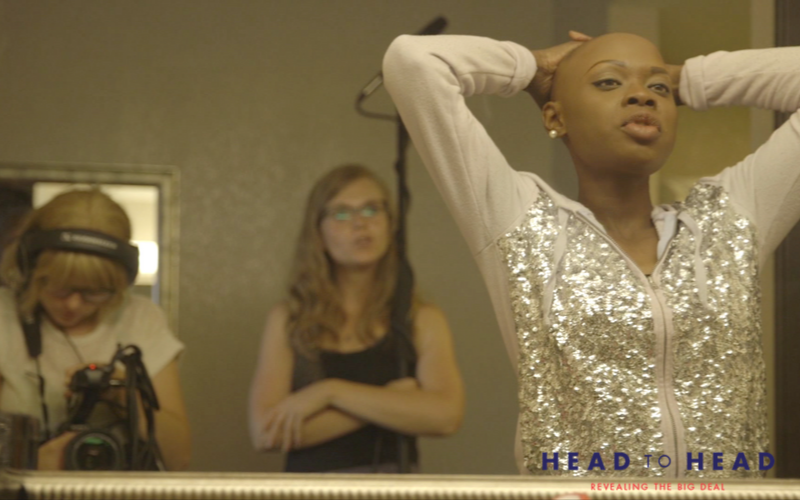When I first launched into our documentary film, Head to Head, about women with hair loss, I thought our goal for the film should be helping women feel empowered to share their true, 100% authentic self with others. I would hear bald women talk about the day they finally ditched wigs and how freeing that is. Look how exciting it is to celebrate those you-go-girl! moments. I thought, “What if everyone could be celebrated like that?” … In reality, it’s easy to wish empowerment on others when I’ve never experienced that kind of traumatic blow to my identity (aka acknowledging my privilege). Of course, this thought came from a good place, but good intentions do not necessarily make a good ally – that was a hard pill to swallow.
Over the last four years of filming, thanks mostly to my sister who has had many tough-love conversations with me, my perspective has evolved – from thinking this film is mainly to help women with hair loss to hoping the biggest shift occurs in people like me. People who have rarely had to face sustained adversity from being “other.” Yes, it was hard work to reflect on my own biases to fully understand when I was helping dismantle harmful social norms and when I was inadvertently perpetuating societal expectations. But it’s harder work to carry the weight of hiding a piece of your identity every single day. No one should feel that weight of hiding.
Let’s pretend we could eliminate all the beauty pressures and standards. We wouldn’t necessarily see an influx of women celebrating their insecurities and coming out from the woodwork exclaiming, “Look at me now! I’m finally free to be me!” In the absence of expectations, judgment and bias, it’s possible we’d simply be making space for authentic choice and genuine self-acceptance. That may not make for juicy television, but it would foster a more peaceful environment.
Back to reality, bias will always be there, it’s only human. Our one film can’t tackle all biases, but if it can help mitigate the social stigma attached to hair loss and wigs, then a woman with hair loss could either more freely choose to wear a wig or not because that’s how she feels most comfortable and confident. If I’m dreaming big, maybe that mental shift toward empathy will bleed into biases or judgments we might hold about other marginalized groups. Maybe…
Here are few simple things we can do to stand up against explicit (i.e. bullying) and implicit (i.e. complimenting a little girl on her hair) social pressures. These are pieces of advice that came up during our interviews with women with hair loss. [That said, I am not an expert voice in good allyship. I do want to acknowledge that there are more comprehensive resources than this for how to be a good ally in life*]:
- Resist the urge to comment on, question or even celebrate someone’s hair unless they have explicitly invited you into that conversation.
- Do your research, talk to experts and educate yourself rather than expecting an individual off the street to explain her hair situation.
- Accept that you may never know something about another person.
- Respect a person’s choice to reveal or conceal a piece of their identity on their own terms. Don’t ask leading questions.
- Don’t get defensive if someone considers your good intentions as offensive. Listen and reflect. It’s not about you. (refer back to that hard pill to swallow)
*To learn more about how to work on your biases and become a better ally:
Watch Denise Barreto’s “Bring Your Brave Face”
Watch Sarah E. Dennis, Ph.D. & Miriam Bhimani’s “Anti-Racism in the Workplace”
Read http://www.guidetoallyship.com/
Content provided by Women Belong member Katy Osborn











































 Introductions - Members Only
Introductions - Members Only Unleash Your Marketing Swagger: Crafting an Authentic Strategy for Customer Engagement
Unleash Your Marketing Swagger: Crafting an Authentic Strategy for Customer Engagement Women Belong Book Club
Women Belong Book Club Women Belong Book Club
Women Belong Book Club Harnessing AI to Boost Your Social Selling
Harnessing AI to Boost Your Social Selling